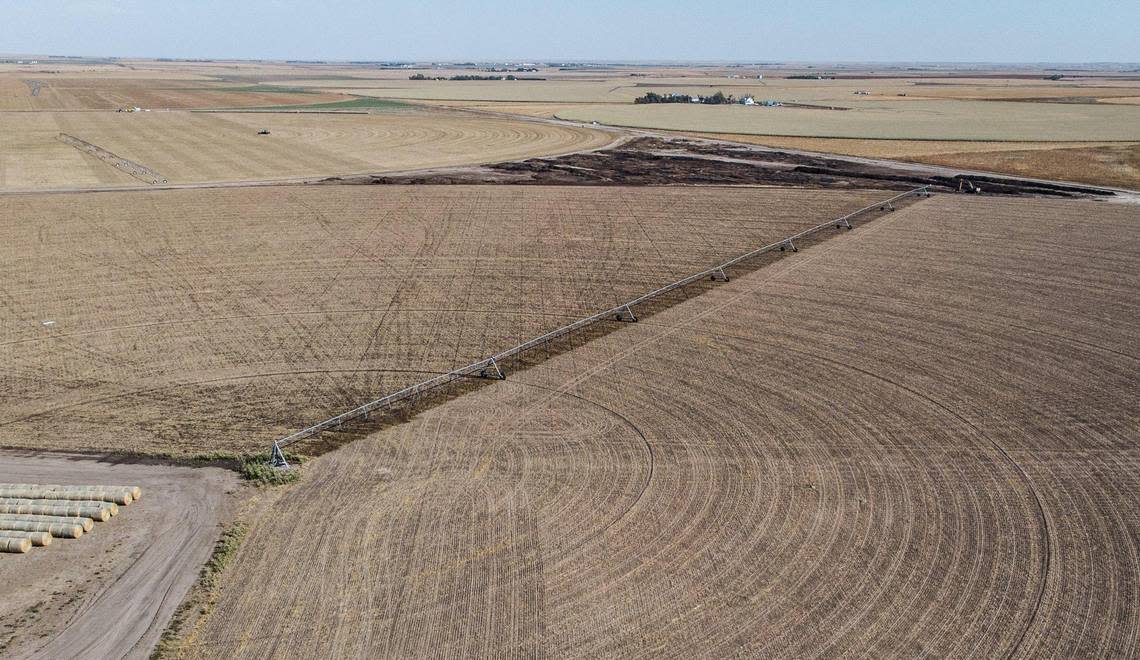Most of Kansas has been in a drought. Sharice Davids wants federal funds to help

- Oops!Something went wrong.Please try again later.
Most of Kansas is in a drought.
It ranges, according to the National Drought Mitigation Center, from areas that are abnormally dry, such as Wyandotte County, to areas that are in severe drought, like Salina.
On Tuesday evening, Rep. Sharice Davids, a Kansas Democrat, sent a letter to the Department of Interior and Bureau of Reclamation, renewing local calls for federal help.
“Given the dire and ongoing threat of crippling drought in Kansas, and the impacts it will have on our state’s economic success and global food security, I ask that you kindly review the plans submitted to you by the Kansas Department of Agriculture and the Kansas Water Office last summer,” Davids wrote.
Gov. Laura Kelly’s administration made its request to the Bureau of Reclamation last August, on the heels of a historically low wheat harvest.
In her original request, Kelly asked the Biden administration to use money Congress approved to help address water shortages in states such as Arizona, California and Nevada, for the issues facing Kansas. The bill allocated $500 million for areas outside of the Colorado River Basin.
The Bureau of Reclamation “received 130 recommendations or plans for 14 river or lake basins” in the 17 western states it covers, according to a March report by the Inspector General of the Department of Interior.
Spokespeople for the Bureau of Reclamation did not respond to a request for comment on whether it has chosen which river and lake basins will be chosen for the money.
For much of Kansas — particularly the parts of the state that rely on the High Plains Aquifer — federal resources are urgent. The water level in western Kansas has been dropping for decades. The state government’s loose pumping regulations and over-distribution of water rights have caused a significant decline in the Ogallala Aquifer, largely driven by the agriculture industry.
The resulting concerns about water quality and quantity helped produce several local efforts to help preserve water and extend the life of the High Plains Aquifer. But the region’s persistent drought conditions — most of western Kansas has been in some level of drought conditions for much of the past two years — have provided little relief from nature.
Ryan Flickner, a spokesman for the Kansas Farm Bureau, said the water issues facing the state matter beyond the agricultural community.
“It’s just as important for a lot of our city dwellers as it is for those who live in more rural areas,” Flickner said. “We’ve got to make sure that we’ve got clean, quality, drinkable water for generations to come if we want to make sure that many areas of Kansas continue to be populated and have economic vitality.”
In 2022, Congress authorized billions in spending in a law called the Inflation Reduction Act. Part of the bill designated $4 billion to help states handle drought, largely through funding efforts to use less water. Already, more than $1 billion has been planned for use in the Colorado River basin.
“The letter that KDA, Gov. Kelly and more recently Rep. Davids followed up on, is working with that good federal partner at the Department of Interior to see what programs are available and would possibly work in the toolbox for Kansas,” Flickner said.
If Kansas is unable to secure any federal money from the project, the state’s farmers may be left to wait for a new version of the Farm Bill. While some crop insurance covers drought, the Farm Bill has also contained funds for water conservation efforts in the past. Those funds help farmers risk trying new tools to use less water on their crops.
The Farm Bill was supposed to be renewed in 2023, but lawmakers are still negotiating the latest version. The House is hoping to discuss its version of the bill in the coming months, though many lawmakers remain skeptical that a Farm Bill can get through Congress over the next few months.
Rep. Jake LaTurner, a Kansas Republican, said he was hoping a farm bill might have some money to help the agricultural community dealing with drought. Those efforts could be helpful in Missouri, a state that isn’t covered by the Bureau of Reclamation, but still has experienced drought throughout most of the state.
“I hope that there’s a path forward to do some of that,” LaTurner said. “Food security is a big deal, and it’s national security. We have to have it, and there has to be some federal backstop in place.”

